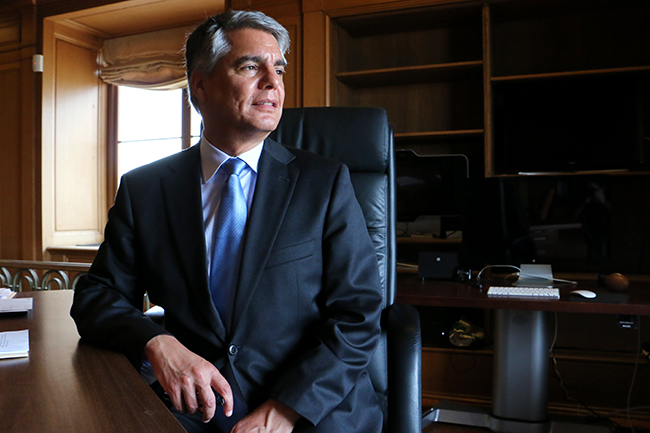Editor’s Note: Some parts of the following interview with University President Gregory L. Fenves were omitted for brevity and clarity.
Daily Texan: What have your first few months in office been like?
Gregory L. Fenves: Well, it’s been very busy. My days are full, my nights are full. On Saturday night, my wife and I had dinner at home together and realized it was the first time we had had dinner at home in a month.
DT: What steps could UT take to become a more diverse campus?
GF: We are doing a number of things. First of all, we are defending the use of race and ethnicity as one factor in a holistic admission to the U.S. Supreme Court, so that’s a very important case for the University of Texas and I believe for the nation. … The educational benefits of diversity are very important not only to the University but to society in general.
… We saw a double-digit percentage increase in the number of African-American students and the number of Hispanic students for first-time-in-college freshmen this fall. … We were not discussing and thinking about policies for how we recruit and retain faculty and the diversity of our faculty. So we have set up now a university-wide council on diversity … In a different area, I feel the decision to move the Jefferson Davis statue … was an important, symbolic measure that the University really does value looking towards the future and getting beyond its past and increasing diversity.
DT: Campus carry: Does your administration share those concerns and are there any elements of campus carry that campus might be well-served to know more about?
GF: I certainly do hear the concerns, and I share the concerns. Chancellor McRaven, myself and others thought the idea of allowing concealed weapons on campus was not a good idea when the Legislature was considering the bill, and I still don’t think it’s a good idea. But the law passed, so we’ve set up a process to look at how to implement the law in the best way we can that is consistent with the legal obligation I have to follow the law. … [The working group members] have been hearing and reading all the comments that have been submitted on the website, there have been two forums, there are some real experts on the legal aspects and policy aspects on the committee and broad representation of students, faculty and some staff also. … They’re working very hard to develop recommendations that they will give to me in a couple weeks, and at that point I’ll look at those, evaluate those and make a decision.
DT: The UT system is currently conducting a four-year study of sexual assault. What programs are in place now, and what more could be done to prevent sexual assault on campus?
GF: We have some of the leading people on understanding sexual assault, causes of it and occurrences of it and best practices to eliminate it. We are leading on the education and research behind sexual assault. … We have several programs and we’ve had them in place for quite a while, Voices Against Violence and Be Vocal, that have been recognized nationally for their role in trying to address a very serious problem. … Any sexual assault on campus is one too many.
DT: Could you speak to some of your goals as president?
GF: We have a great university, and my overall goal is to make it even greater. I think the University of Texas has enormous potential, to not just lead the state of Texas — I believe we already do — but to lead the nation in education and research. And one goal that is very exciting that I helped start when I was provost is how we bring our education and research mission even closer, so that every student that is getting a degree at the University of Texas benefits at a research university. … We have some very ambitious ideas about increasing the amount of and impact of research at UT to benefit society, and I think that will help make this university a real star in the country and the world. And the third goal is make sure the Dell Medical School gets a strong start when we welcome the first class of medical students next summer, and we’re making great progress on that.





















